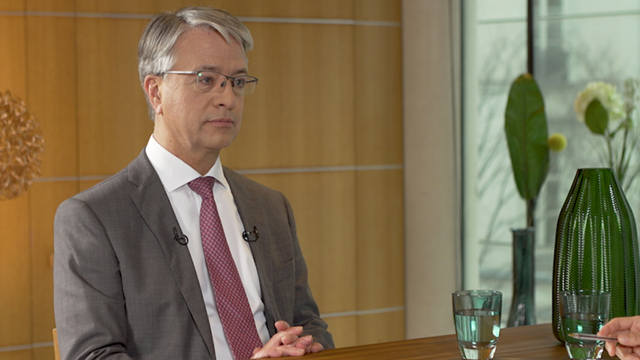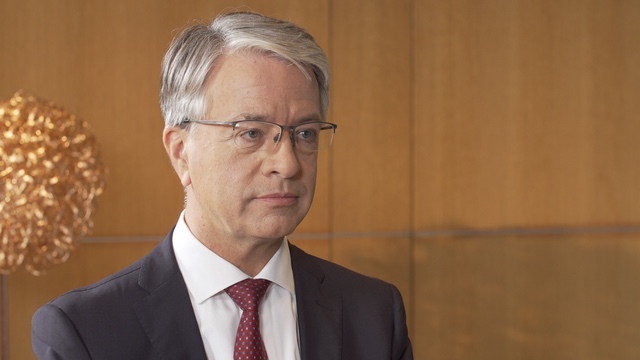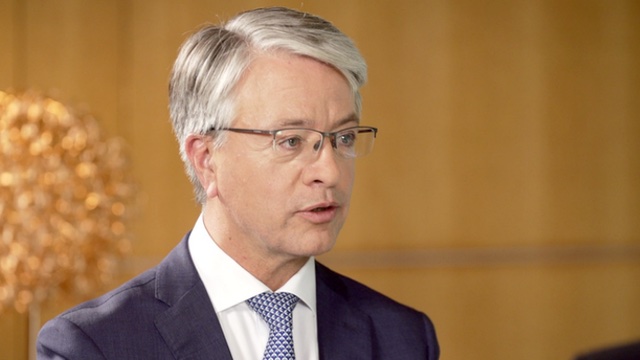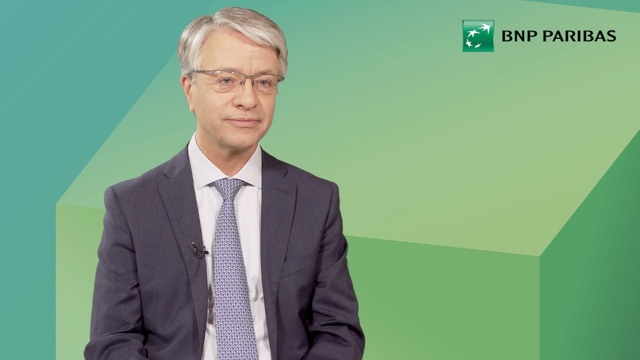EuroBusiness Media (EBM): BNP Paribas, one of Europe's largest banks, reports results for the third quarter of 2012. Jean-Laurent Bonnafé, welcome. You are the CEO of BNP Paribas. What are your comments on your third quarter results?
Jean-Laurent Bonnafé: BNP Paribas delivered solid results in the third quarter which showed a marked rebound compared to the third quarter of last year which was affected by the sovereign crisis.
Net income for the Group stood at 1.3 billion euros which actually stands at 1.6 billion if we exclude one off elements. Cumulating the 9 months, the net result tops 6 billion euros, meaning that BNP Paribas confirms its profit generation capacity in a difficult environment.
Revenues of the operating divisions increased by 8.4% with growth in the three operating divisions : +1.3% in Retail Banking, +3.7% in Investment Solutions and +33.2% in CIB which benefited from the market rebound during the quarter and compares to a third quarter 2011 impacted by market turmoil. Good cost control was confirmed across the board and, despite an increasingly challenging environment, cost of risk remained still at a low level of 55 basis points as a percentage of customer loans.
BNP Paribas continued to boost its deposit base as confirmed by the further increase in Retail Banking deposits which were 8% up compared to the previous year with Domestic Markets over 5% higher. Similarly, we also continued to grow our Corporate Banking deposits in CIB which have increased by 9 billion euros so far this year.
With the third quarter we completed the implementation of our adaptation plan which has significantly contributed to the remarkable strengthening of our solvency ratios. Under fully loaded Basel 3, our common Tier 1 ratio now stands at a high 9.5%, equivalent to 11.4% under Basel 2.5.
BNP Paribas has once more succeeded in growing its net book value per share which topped 60 euros at the end of September while the tangible book value per share arrived at close to 50 euros, all this showing the very good capacity of the Group to create value for shareholders.
EBM: In your Domestic Markets, we are seeing a slowdown in revenue generation: is this a matter for concern? Do you think you can withstand it?
Jean-Laurent Bonnafé: In our Domestic Markets, the low interest rate environment together with the slowdown in the demand for credit, and despite margins holding up quite well, are putting some pressure on revenues. In this context, BNP Paribas is consistently adapting its offer to best suit its client needs, and continues to launch commercial initiatives across the different networks of the Domestic Markets.
One of these initiatives is the One Bank for Corporates which was initially launched in the four markets at the beginning of 2011 and so far has contributed nearly 2200 new accounts opened by Domestic Markets corporate clients in BNP Paribas’ global network.
Similarly, for individual clients, we have recently launched the Priority offer which has already met significant success. For example in France and Belgium, where it was first introduced, we have already received some 200,000 subscriptions to date.
At the same time, cost control measures continue to be implemented in each market and are ensuring a continuous improvement in the operating efficiency. In fact in the first 9 months of the year the cost / income ratio improved by 0.3 percentage points in France, by 1.8 points in Italy and by a full 2 points in Belgium.
Hence, despite the challenging context, we expect that the combined effect of commercial dynamism and strict cost control will translate into further improvements in operating efficiency in our Domestic Markets this year. This alongside with our well known good risk control will allow us to successfully go through the current economic environment.
EBM: Could you comment on your CIB activities in the third quarter? Did you benefit from the pick-up in financial markets in your Capital Markets? And where do you stand with regard to your adaptation plan?
Jean-Laurent Bonnafé: Our CIB performed well in the third quarter driven by a rebound in Capital Market revenues. As already mentioned, revenues went up by 33.2% as compared with the third quarter 2011 which was affected by losses on sovereign bond disposals.
In Capital Markets revenues were driven by a strong Fixed Income, especially in the month of September, and by a rebound of Equity from the low levels of the previous year. Fixed Income benefitted from sustained primary activity and performed well in rates and credits. In the 9 months BNP Paribas successfully kept its number 1 position in terms of “All Bonds in Euro” and ranks number 7 in terms of “All International bonds”. Equities and Advisory did very well on the Equity Linked market, ranking number 2 in “Europe, Middle-East and Africa” and being bookrunner for 7 transactions in September alone.
In Corporate Banking revenues decreased in line with our deleveraging. Thanks to the continued effort of our teams, we maintained our leading positions in syndicated loans in Europe, ranking first for number of deals and second for volumes. At the same time we continued to develop our “Originate to Distribute” model with some landmark deals for instance in Asset Financing.
In addition, we continued to strengthen our Cash Management, where we rank n°5 worldwide and to develop our deposit gathering capabilities, with the deployment of the Corporate Deposit line. As I mentioned before this approach has been key in boosting our Corporate deposits which increased by 5 billion in the third quarter alone.
Regarding the CIB adaptation plan, the target of reducing risk weighted assets by 45 billion euros is now fully completed. Total cost of asset disposals has been limited to roughly 250 million euros which is much lower than initially envisaged, thanks to the quality of the portfolio and the dedication of our teams. This step having been successfully completed, CIB is now well positioned to move forward.
EBM: How has your Investment Solutions division performed during the quarter? More specifically, do the outflows in life insurance in France pose a real threat to your fee income growth potential?
Jean-Laurent Bonnafé: Overall Investment Solutions delivered a good performance in the third quarter. Revenue growth was mostly driven by higher Insurance and Securities Services contributions. Even excluding the impact of Greek provisioning in the third quarter of last year, Investment Solutions closed the quarter with an improvement in pre-tax income of 20%.
Assets under management increased to 886 billion driven by the recovery of financial markets in August and September.
In terms of net inflows we enjoyed good performances in Wealth Management both in our domestic networks and in Asia. Insurance also saw a positive evolution driven by net inflows in Asia, especially Taiwan and South Korea. Securities Services continued to develop nicely, gaining significant mandates and pursuing its development in the US, in Asia and in Latin America.
Referring to the second part of your question, it is true that life insurance continued to suffer outflows in France but BNP Paribas’ outflows were much more limited than the market’s for individuals and actually positive considering our global life insurance business. In addition, outstandings benefited in the first 9 months from the improvement of financial markets. Finally, and as I have just mentioned, we continue to expand our international activity in the Insurance business which globally delivered revenue growth close to 6% on a like for like basis for the first 9 months of the year.
EBM: Asset quality remains an issue for banks, especially in countries like
Italy. How has your cost of risk evolved in the different business lines?
Jean-Laurent Bonnafé: The Group’s cost of risk is still at a low level this quarter. In the Euro zone the general economic environment is weak and this is certainly the case in Italy as you mention. In this context, we are continuing to finance our clients while keeping our rigourous risk approach. This is why our cost of risk remains well under control. This is the case in France and Belgium, where cost of risk is at a low level but also in Italy where BNL’s cost of risk has only moderatly increased.
In the US BancWest continues to see lower cost of risk while it is beginning to stabilize at Personal Finance following significant improvement.
Finally, we saw a moderate pick up in Corporate Banking in CIB where we had almost negligible cost of risk up to now benefiting from provisions write backs.
EBM: Since the deleveraging, funding is less of an issue for you, but
constraints in some geographies or businesses may push you towards more localised funding. How are you adapting your foreign entities to these changes?
Jean-Laurent Bonnafé: BNP Paribas has ample liquidity. The adaptation plan that we have completed has effectively modified our funding structure as well. In fact, BNP Paribas has progressively created a surplus of stable funding sources versus our clients’ funding needs both in euros and in dollars. This excess has increased further in the third quarter by 19 billion euros reaching 71 billion and, expressed as a ratio, it now stands at a high 110%.
I also remind you that concurrently we have been boosting our immediately available reserves of liquidity. Deposits at Central Banks plus unencumbered assets eligible with Central Banks stand at a sizeable 239 billion at the end of September.
Changing regulations - that are yet to be finalized - are undoubtedly pushing towards more balanced funding at single entity level, which is what the bank is doing. For example, we have been redressing BNL’s funding gap through securitizations and issues of Retail bonds. This gap has been hugely reduced in just over one year to 13 billion euros at the end of September. It is clearly not an issue for the Group.
EBM: The regulatory and fiscal environment is about to become harder for banks, for example in France some taxes have been increased and there is talk of splitting off corporate and investment banking from commercial banking activities. What is your strategy in these uncertain times?
Jean-Laurent Bonnafé: First of all I would like to remind you that only about a quarter of our pre-tax income and of our credit risk weighted assets are deployed in France. BNP Paribas is today one of the top European banks with 4 main domestic markets in Europe and a significant global footprint. Increases in taxes and levies have been implemented in a lot of countries and our competitors in the Eurozone, in the UK and in the US have to live with them as well.
Regarding regulation, I have already said that it was important to know as soon as possible the rules of the game. In any case, speculative activities are marginal within our business model which is client oriented.
So our strategy in these uncertain times is to continue to do what we do best, that is to say accompany our clients in their financing needs while being able to adapt our offer to the changing environment and to client expectations.
EBM: You have successfully rebuilt your capital position. Does this give
you the opportunity to put external growth back on the table or are you more likely to favour internal growth by developing your businesses in the US and in Asia?
Jean-Laurent Bonnafé: Thank you for your question. I would like to specify that we have not rebuilt our capital position as it was never dented by the crisis. We have simply further strengthened it organically and over a relatively short period of time. At 9.5% we have today one of the highest fully loaded Basel 3 core Tier 1 ratios but we cannot contemplate significant external growth possibilities before full clarification of the regulatory environment.
Meanwhile we continue to focus on developing our presence in growing markets and businesses.
Given our capital position, we are ready to pursue organic growth opportunities in the US:
_ - on one side for example through the further strengthening of our Fixed Income platform within CIB,
_ - on the other side, through the roll out of the retail banking model to BancWest which is developing its corporate banking and private banking activities.
Similarly we are continuing to grow our extensive client franchise in Asia-Pacific where we already generate over 12% of our non-Retail revenues. We have a significant presence in 14 countries with full banking licences in 12 of them. We aim to capture both the fast growth in Asia by assisting our global clients in their Asian activities and vice versa sustaining Asian clients looking at investment opportunities in the Western world.
Another example of a growing market is Turkey where we are present through TEB. Results over the past quarter confirm very strong volume trends translating into sizeable revenue growth and a further improvement in operating efficiency. In addition cross-selling with CIB and Investment Solutions continues to intensify.
If we look at businesses, within Investment Solutions there are two businesses that continue to develop strongly in conjunction with the overall Group development: Insurance and Securities Services.
When I speak of Insurance I am speaking of BNP Paribas Cardif, a global player for personal insurance that is developing its offer in the Domestic Markets and in Turkey while investing in its Asian and Latin American presence. Our Insurance business continues to churn out strong results as depicted by the revenue growth I previously mentioned and contributing some 770 million euros of pre-tax income in the first 9 months of 2012.
Another business that we continue to invest in is Securities Services. We are talking of the leading provider of securities services in Europe and a top 5 global player. Main axes of growth are the US, Asia and Latin America.
In conclusion, having a strong capital base affords us the possibility of pursuing growth in fast developing markets and businesses.
EBM: Jean-Laurent Bonnafé, CEO of BNP Paribas, thank you very much!
Jean-Laurent Bonnafé: You’re welcome!






